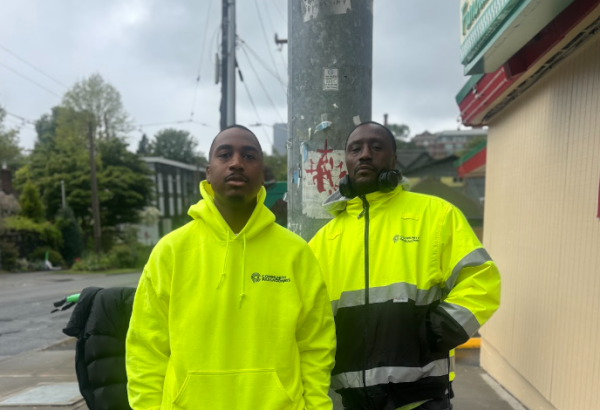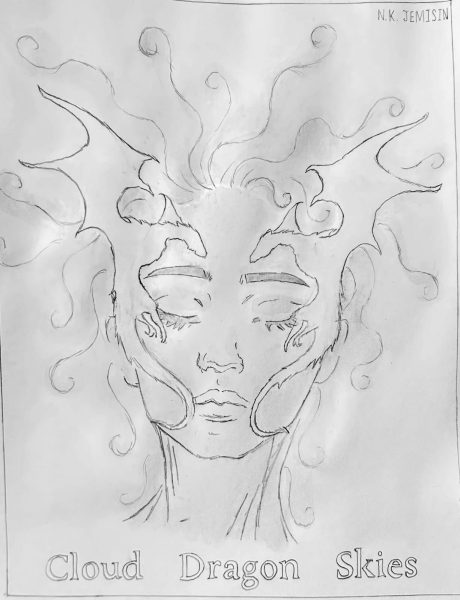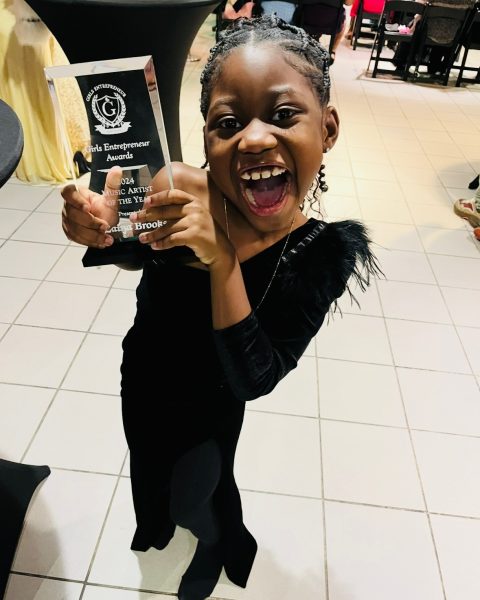Meet The Teachers
Get to know Garfield’s favorite faculty.
In December 2021, The Messenger staff created an interview-based oral history collection to record the transition from virtual to in-person learning. These are some highlights from our archival oral history collection of educators at Garfield High School.
Why Garfield?
“I spent a large measure of my adult life overseas, in Europe, and the southern hemisphere. So I have more of a cosmopolitan focus, especially with ….music, and film. These are art forms that are spoken internationally, and I tried to bring that into the teaching environment, because demographically, Garfield probably is the only school from my knowledge, in the district, where we have such a unique and expansive representation of people whose origins come from around the world. It’s wonderful to celebrate that diversity and beauty of all the cultures and ethnicities that we have reflected here.”
-Pugh
“When I was student teaching…we did a Summer Bridge Program at Garfield. The students that are juniors now, some of them came in as eighth graders during the summer and did a few weeks [with the] program. I already knew some of the students, which was really cool. I just had a really good experience. Just the history behind Garfield as someone who grew up in Seattle. I mean, that article that came out recently in Sports Illustrated about kneeling. So awesome. Garfield is rad.”
-Brown
“A few years ago, before I completed my master’s in teaching, I did my observations here at Garfield and I liked the community. The diversity in the community and the way that people are, thinking in terms of social justice and change, right, which I think is very active here in the student body and I love that.”
–Cicolini
“I live in the neighborhood, and beyond that, I love the students in the community at Garfield. It’s a really special place, so I tried to get this position and I was lucky enough to be looking for a position when there was one available in the science department. There isn’t every year you know, but it was a goal for me to teach at Garfield. This is the number one place on my list.”
-Austin
Favorite Thing About Teaching?
“I think my favorite thing about teaching is the moment where you see that “Aha!” moment in a student’s face and finally they get it. That’s a wonderful moment, but I also just love seeing, hearing people laugh and smile and when you’re reading a good story. That’s probably why I love ELA the most, I love stories and novels and plays and, you know, kids working with new materials and finding a new interest.”
-Brown
“My favorite thing about teaching is just relationships with students. I think that’s the best part of like, getting to know other humans and like, just like form communities that feel authentic and everyone’s so interesting. I really just like value those relationships.”
-McGrath
“How much I learned from my students, just their experiences and or ideas and thoughts that you guys bring to the table. Teaching a whole bunch of students, I feel like I’m in here to learn as well and make mistakes and just go through the content together. So that’s kind of my perception of teaching. It’s like let’s do this together and try and learn something new every day.”
-Solbakken
“I guess my favorite thing is seeing students get excited about the things that I get excited about, and sharing my passion. I guess that takes me back a little bit to a story about a student. During my first year teaching at Garfield, I had a student [who] was not interested in biology at all. She was very bright, but not engaged [with the class]. She was a ballet dancer, and wanted to go into dance professionally. I just remember talking to her saying hey, you never know just never know what’s gonna happen. So just keep all of your options open and do your best that you can. Because there’s different skills you can learn as you’re learning about a subject area. And so she came around, and went from like a D+ to an A student. She ended up going to college, but she got injured and was not able to do ballet. [The student] got into biology and decided to become a doctor. So she came back and then told me the story of how she wanted to thank me for pushing her to go into biology, even though she wasn’t that interested at the time.”
-Stever
“When somebody realizes that they are artistic or that they are creative. Because a lot of people say “I can’t draw or I’m not an artist.” And then they find out that they really can.”
-West
What Made You Want to Teach?
“I really hated high school myself, it was a really bad experience for me. I was outed in high school, kind of against my will, and faced a lot of bullying over it for most of the rest of the time I was in high school. I always loved history, so I wanted to be a history teacher, but then because of my experiences, I was like: oh hell no, I’m never going to be in a high school ever again. It took me a long time. During my 20s, I worked as a preschool teacher in Boston and then I just decided, hey, I want to do this. And my wife really encouraged me to go back to school to be a teacher. And I wanted to be a teacher because I felt like it would have meant a lot to me, to have somebody that I saw myself in, when I was in high school. So I wanted to be that person for other students.”
-Felpo
“I have a line about this that I say at parties, which is that I’m a teacher. It’s the perfect intersection of my skill set and doing something useful with my life. I’m good at reading, writing and talking. I hope I can use my skills in a way that’s doing some good. That’s why I’m a teacher, and I think being around teenagers is really rad. And I want to make sure what I do with my life is of service. If you’d asked me in high school, I would have never wanted to go to school again. I didn’t go to college for years after high school because I hated school so much. It still kind of makes me laugh that I am a teacher sometimes, but I’m glad I am. It’s a really good fit for me.”
-Zimmermann
“I was going into being a doctor for a while, then I thought I’d be a chemist. And I was a chemist for a while. But there are things in science that are controversial and the company I ended up working with was making bombs, so I decided not to work for them. And then I was working for another [company]. And in order for me to get to move up, besides just being in HR, which they love to put women into HR. And in order for me to move up, I had to go back to get some more education. And so then I had a personal conversation about what I really want to go back into education, get higher education, or a higher degree for. And so that’s what I realized if I looked back on all my time, that I had always loved working with people, like tutoring and helping people learn science. And I also felt like learning science was really empowering to me, and I thought, “well, wouldn’t it be wonderful to offer for science to be taught in a way that is empowering for everybody?” Because it was for me.”
-Jones
“Let’s see. Before getting into teaching, I pursued doing graduate work. I researched chemistry for a while and decided that I didn’t want to continue on the academic research track that I was on. I knew that I was always drawn to teaching, both through experiences in graduate school as a TA and just throughout my whole life, enjoying the process of teaching. So, after leaving that program, I did some other things for a while and then knew I wanted to come get a degree so that I could teach, so I had to go back and get a teaching certificate.”
-Miller
“I didn’t think that I’d want to teach. Nowadays, kids seem to have some direction. [It] seemed like as freshmen come in, [they think] “I’m gonna do this.” I had no clue. I did some Peace Corps around the world stuff, went into pre-med and the movies. I always liked coaching and coached a bunch of different sports. I worked at a Marine Institute where a lot of people came through and did our marine program and I said, Oh, that’s just fun working with kids that way, so that’s why I ended up teaching.”
-Spangenberg
Most Difficult Thing About Teaching?
“I’m still a new teacher. So I haven’t found the most difficulty. I feel like every challenge that I’ve had, I can work through it right now. But the most difficult thing is when I feel like when the student doesn’t want to communicate. That’s the hardest part, that’s what I’m dealing with right now is how can I get them to open up so I can really see what they need. So [I’m] working on that, communication, and working on building relationships with students and their families. I have students who don’t speak English, and finding ways to communicate with them can be very challenging when there is no external support.”
-Yusuf
“I think the most difficult thing about teaching is that you’re never going to be completely done, and you’re also never gonna have time to do everything…you will always have something else to do, always have more that you could do. It’s challenging because when most people feel like they’ve accomplished something,; whereas in teaching, you can’t complete everything. You’re never going to be able to grade everything, you’re never gonna be able to plan for everything, or for every situation, or help every single student be as successful as they possibly can be because you’re only one person. You always want to do more. It’s challenging because it takes a lot of emotional capacity and it also takes a lot of strategizing about where you want to put your energy, what is the most important priority, and really focusing on those things so that you can actually be productive, you can still be a good teaching, you just need to accept that you’re not going to be able to do everything. That sometimes you do need to actually go home. You know, you can’t stay here until nine pm every night. It’s not sustainable.”
–Lai
“It’s incredibly time demanding as a job and has gotten more so…it’s [gotten harder] to advise a club now…Looking at the public, you get a whole cross section you guys, some of you guys you’ve got just like maybe got a really nice deck of cards, whether that’s your background genetics, all kinds of stuff, and other kids have been dealt really crappy deal of cards. And you all are just dealing with a lot of challenges. It’s hard. Knowing that you can only help people so much. Knowing that you guys are like 16, and you’re going to be dealing with this. I’ve got friends who have been dealing with mental health issues since they were in high school.”
-Truax
“I think just not having enough hours in the day to get all the work done, to make sure that a lesson goes perfectly. And then to make sure that I get to have a connection with all my students, and to make sure I’m giving them what they need. You know, if class sizes were half what they are now, I feel like I could, you could do more to personalize, and make sure that you had a chance to check in with everyone all the time to make sure they have what they need.”
-Harris
Funniest Student Story?
“Once upon a time I had two students named Alex Nguyen. That’s a Vietnamese [last] name. One was a sophomore and one was a freshman. [Calling on them was difficult] because both of their names were Alex Nguyen, and both didn’t have a middle name. I didn’t want to say tall Alex and short Alex because [it was mean]. [So] I decided okay, one’s a ninth grader and the other is a tenth grader, so I called one Alex sophomore and one Alex freshmen. They were both really good students, and always came to school every day. One day they’re both gone. And then this boy in the back says, ‘hey, Mr. Nomura looks like today you have a no win situation.'”
-Nomura
“Okay, funny story.. So we try to read the Messenger [in class]. And definitely in our ninth grade classes, we just pass out the Messenger and read it. I love it, and the kids are always amazed to see the work that other students do at this school. But the first time we handed out the Messenger this year, the newspapers were falling all over the classroom. It turns out a lot of our ninth graders have never held a physical newspaper before. They were saying, ‘Where’s the staple? How is this thing held together?’ So it just reminded me, ‘Oh, yeah, of course you haven’t [held a newspaper]’. Well, you know, we love the Messenger, keep it coming man.”
-Austin
What Do You Want Students to Take From Your Class?
“I think success is just about being the very best that you can possibly be and never really worrying about it. At times, our culture in general, we tend to compare ourselves to other people, instead of just trying to develop ourselves. I don’t think sometimes people truly appreciate how great they are or how great they can be.”
– Washington, B
“That there is no right or wrong way to be smart. Everyone is smart in their own way, just because you don’t know one specific thing that I happen to know, I’m sure there’s some things that you know, that I don’t know.”
– Parker
“I want them to take away a feeling of success, that and some level of confidence, because I think that’s usually the biggest problem that impedes people from doing well in math: just already assuming that they’re predisposed to being bad at it. They have gained the confidence to know that they can succeed and maybe even try a harder course than they would have initially.”
– Waterman
“I want them to get from my class is for them to be not afraid to ask questions, and to not be intimidated, because that is what a lot of businesses are counting on students or people to be intimidated… having students feel empowered and smart enough to ask questions, is a way to counter all of the things that go into trying to take their money away from them.”
– Calloway
I want them to feel empowered to know how they can live their own style of what healthy means to them. I want them to feel like they have the tools and the education to translate what a healthy lifestyle is going to mean to them when they graduate and when they’re outside of school.”
– Purcell





